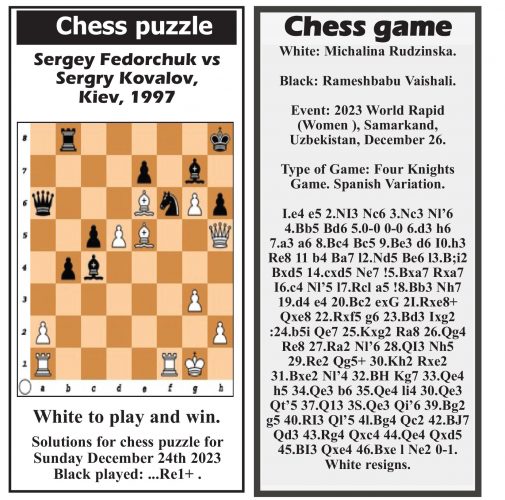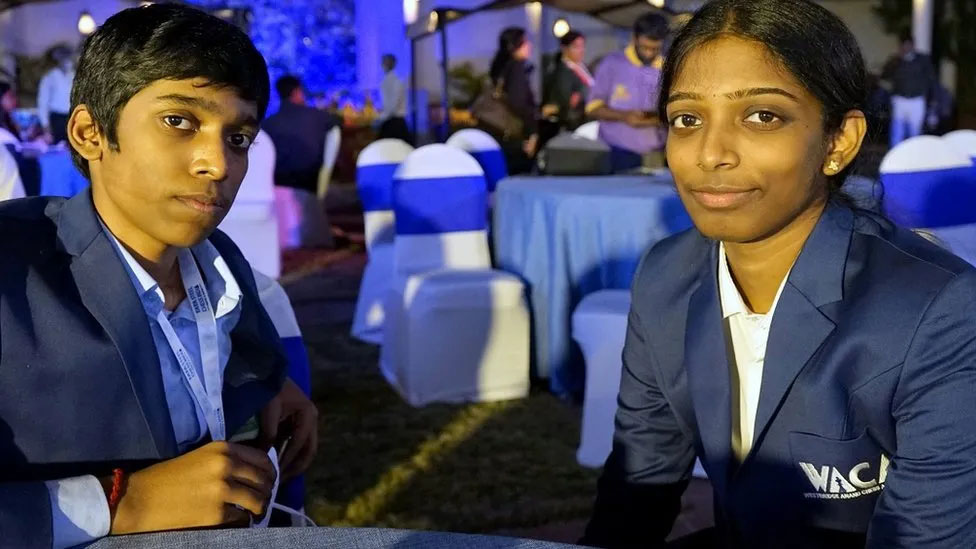(BBC) In the last decade, few have fit the chess prodigy descriptor as well as India’s Rameshbabu Praggnanandhaa. He was 10 years old when he became the then-youngest International Master, the second-highest title after Grandmaster.
He became the second-youngest Grandmaster in 2018, defeated five-time world champion Magnus Carlsen three times in a row in online games, and is only the second Indian after Viswanathan Anand to make a World Cup final and qualify for the Candidates tournament.
While all of this unfolded, another chess-playing member of his family diligently awaited her turn – Praggnanandhaa’s sister Vaishali, who is older than him by four years.

In November, 22-year-old Vaishali defeated three former women’s world champions to win the Women’s Grand Swiss tournament and qualify for the Women’s Candidates tournament.
It’s a remarkably successful kinship in chess. The role of sibling rivalry can hardly be overlooked.
“When Pragg became the youngest International Master, he crossed my rating for the first time. Suddenly at home, the focus was entirely on him,” Vaishali told BBC. “It upset me. I don’t think I managed those emotions well,” she says and adds that this took a toll on her playing.
“My parents would chat with me about it and I’d be okay for a while. But every time he had a great result and the attention was on him, I would slip back to feeling a bit miserable. It took me some time to overcome those feelings and accept that he is exceptional. Once I completed my Woman Grandmaster (WGM) title, I felt better about myself. Over the last couple of years, I’ve been nothing but proud of his achievements. I see the hard work behind it,” she says.
When they began training under Grandmaster RB Ramesh as kids, Vaishali was the higher-rated player of the two. Over the years, their journey in the game took different paths and it was often accompanied by stabs of envy for the one trying to keep up.
“It’s never easy for the sibling who’s on the other side,” says Ramesh, For the longest time (as recently as the World Cup in August) the media would turn up at their home in large numbers after every major result from Praggnanandhaa and ask Vaishali how it felt to be his sister or ask their parents how proud they were of their son.
“I think somewhere in her head it converted into pressure. The pressure to perform and not be ignored,” says Ramesh.
The urgency to get to a Grandmaster title and not be cast into oblivion was visible in her confounding opening choices at times. “I would look at her live games sometimes and wonder, why is she playing this? I could sense the desperation and pressure. What she’s been doing well lately is sticking to what she knows best. The results are showing,” he says.
Praggnanandhaa and Vaishali’s relationship evolved over the years and the pandemic phase brought the siblings closer. Today they’re each other’s fiercest mascots and closest confidantes.
“During the pandemic, we really got talking about all sorts of things that perhaps we never did before. He has a lot of confidence and clarity. Sometimes when I’m feeling lost or unsure, I turn to him. He often has the right answers,” Vaishali says.
“Not too many others in chess have someone they can go back to, a family member, or an active player with whom they can analyse games, and talk chess for hours. It’s only now that I think that we both really value this privilege,” she adds.
In 2012, Vaishali and Praggnanandhaa won the nationals and qualified for the Asian youth championships in Hikkaduwa, Sri Lanka. Back then the primary concern for the family was shoring up the money to meet travel expenses for three. They managed to stitch together the funds and both returned champions – Vaishali in the under-12 girls, and Praggnanandhaa in the under-8 boys.
“We have grown up winning age-group tournaments together. Recently, we won the same medals at the Olympiad and Asian Games. Now we’re headed to the biggest tournament of our lives together.”
Theirs is the kind of rare, rousing story that chess fans and writers wait to watch and write about and has everyone else curiously invested in this pair of siblings who are overhauling records, and browbeating opposition while sneaking smiles at each other.






